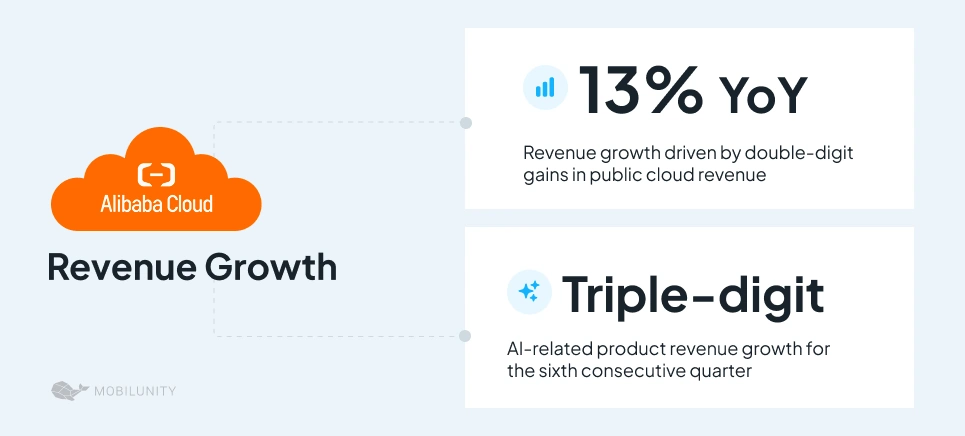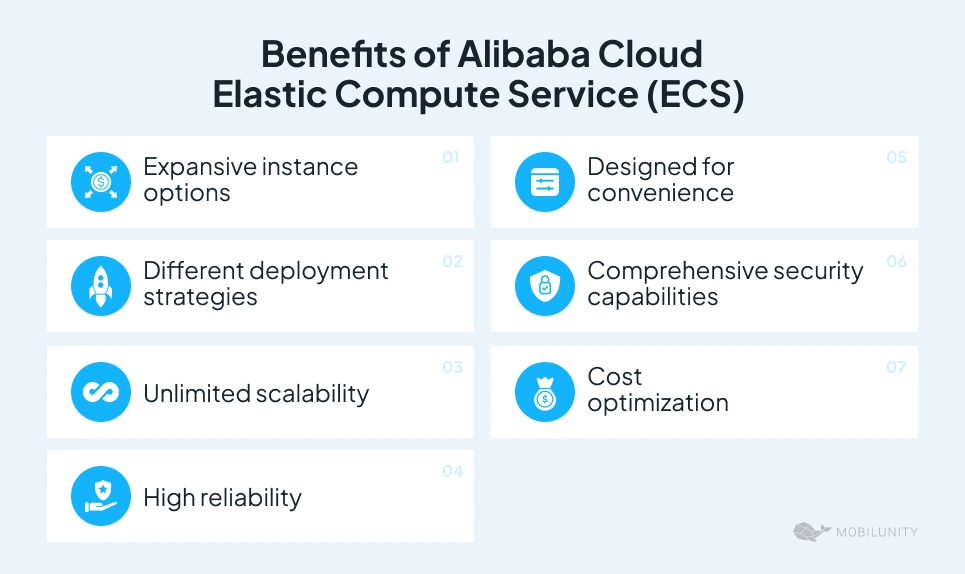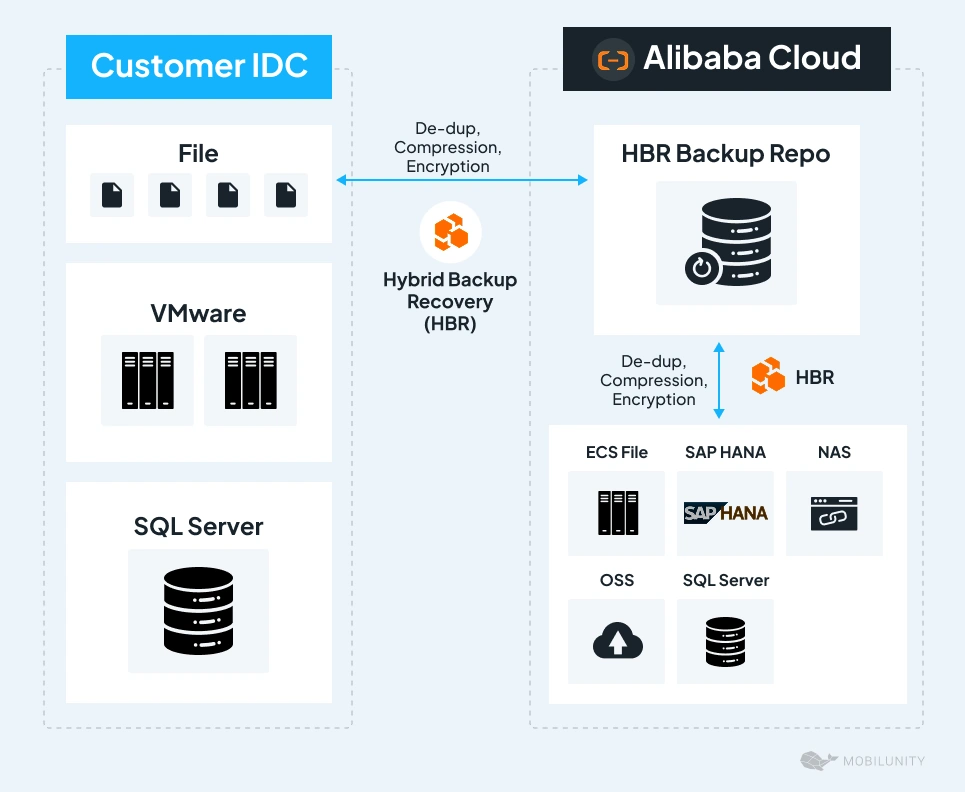Exploring Alibaba Cloud as a Cost-Effective and Secure Solution
- What Are Alibaba Cloud Services and Why Choose Them?
- Benefits of Alibaba Cloud Elastic Compute Service (ECS)
- Insights from Our Team: Why Alibaba Cloud Can Be the Right Solution for Your Business
- Core Security Features of Alibaba Cloud
- Understanding Alibaba Cloud and AWS
- Alibaba Cloud vs Amazon Web Services: Selecting the Optimal Cloud Provider
- Choosing the Ideal Cloud Solution for Your Company
- The Bottom Line
With more companies transitioning to the cloud for enhanced flexibility and cost efficiency, selecting the appropriate provider is essential. Alibaba Cloud, also known as Aliyun, is rapidly emerging as a formidable rival to larger players such as AWS and Google Cloud platform, providing various services including Elastic Compute Service (ECS), Object Storage Service (OSS), and Alibaba Cloud Database. These services are particularly favored by companies aiming to expand internationally.
In 2024, Alibaba Cloud grew by 13%, reaching $4.35 billion in revenue in the fourth quarter. Looking ahead, Alibaba Group plans to invest $53 billion in cloud and AI infrastructure over the next three years, showing their commitment to growing the cloud services they offer.

In this article, we delve into the reasons Alibaba Cloud is ideal for many businesses, highlighting its notable features, security measures, and even compare its value against AWS in terms of cost and performance. If you’re running an eCommerce website, a tech startup, or pretty much any scaling business, then Aliyun can be the right pick for you.
What Are Alibaba Cloud Services and Why Choose Them?
Alibaba Cloud is the cloud computing arm of one of the world’s largest e-commerce companies. Based in Hangzhou, it has become one of the most popular and trusted cloud-based services globally. Known for its wide range of features, Aliyun is a favorite for businesses looking for reliable solutions.
Let’s explore the top benefits you get when choosing this solution as your preferred cloud service provider.
| Benefit | Description |
| Uncompromised Security | High-level protection for data, certified by top global security standards, with customizable security options. |
| Exceptional Elasticity | Excellent scalability with vertical and horizontal scaling to grow with your business. |
| Flexible Storage Solutions | Flexible cloud storage with easy resizing and performance matching to data center standards. |
| Trusted and Reliable | Trusted by over 20 million global users and the first to receive ISO27001 certification for data security. |
| Hybrid Features and Computational Power | Powerful hybrid features and high computing power for efficient web traffic handling and data management. |
| Reliable Backup and Restore | Backup and restore feature that ensures fast and secure recovery of accidentally deleted data. |
Benefits of Alibaba Cloud Elastic Compute Service (ECS)
Alibaba Cloud Elastic Compute Service (ECS) offers a wide range of instances, delivering flexible, scalable, and reliable compute capacity in the cloud. With ECS, businesses can eliminate the need to invest in and manage their own IT infrastructure, enabling them to focus on developing and deploying applications.

#1. Expansive instance options
All businesses have unique needs, which is why ECS offers an array of instances tailored to specific requirements. Enhanced flexibility and customization guarantee that businesses will always get the right combination of serverless computing power, memory, and data storage that their applications need.
- State-of-the-art computing architecture. ECS instances are based on x86 and ARM architectures enabling the execution of almost all workloads.
- Diverse instance types. General, memory optimized, GPU enhanced as well as storage enhanced instances and more. Each instance is optimized to achieve maximum value for money whether one is running big data or high-performance applications.
#2. Different deployment strategies
ECS can adapt to many business needs using custom deployment strategies:
- Virtual machines. Standard cloud-based instances for typical use cases.
- ECS bare metal instances. Direct access to processor and memory resources, ideal for high-performance applications with minimal overhead.
- Dedicated hosts. Physical servers dedicated entirely to you, providing enhanced control over instance placement and resource management.
#3. Unlimited scalability
ECS allows both vertical and horizontal scaling to accommodate varying workloads:
- Vertical scaling. Increase compute, storage, or network capability as your business grows.
- Horizontal scaling. Add or remove instances automatically with auto-scaling based on traffic patterns while ensuring performance predictability at minimum cost.
#4. High reliability
ECS ensures high availability and durability:
- Service reliability. 99.975% single-instance availability, 99.995% multi-instance availability across zones.
- Data durability. Multi-replica mechanisms applied to storage attached to ECS instances, achieving 99.9999999% data durability(Nine 9’s).
- Disaster recovery. Instance failover, snapshot saves, and automatic alerts allow services to remain online and data to be recovered even if an instance fails.
#5. Designed for convenience
ECS simplifies instance management and deployment with a user-friendly graphical interface:
- User-friendly console. Access ECS through a web console to start/stop/update ECS instances.
- Push-button deployment. Pre-configured images on ECS lets multiple instances be deployed using the same configuration setup swiftly.
- Rich management tools. Tools such as Terraform, CloudOps Orchestration Service, and Server Migration Center (SMC) are offered by Aliyun to assist with the administration and migration of cloud data.
#6. Comprehensive security capabilities
For applications hosted on ECS, Alibaba Cloud provides security services that host certain applications:
- Diversified security features. To protect your resources, Anti-DDoS protection ports, intrusion detection, vulnerability scanning, trojan scanning, and others have been incorporated to broaden the security feature set.
- Hardware encryption. Data protection can be enhanced by the support of Virtual Trusted Platform Module (vTPM), Intel Software Guard Extensions (SGX), and hardware encryption.
#7. Cost optimization
Flexible billing options make it easier for companies to manage their spending on the cloud with Alibaba Cloud:
- Multiple billing methods. Depending on the needs of the company, billing can be done via subscription, pay-as-you-go, or even preemptible instances.
- Flexible pricing models. ECS provides reserved instances and savings plans for lower costs. Savings plans are flexible contracts that allow customers to get discounts for agreeing to use certain services for a year or three, while reserved instances allow significant savings if long-term capacity reservations are made.
- Mix-and-match billing. Different kinds of billing can be merged in order to achieve a balance in cost and performance.
Insights from Our Team: Why Alibaba Cloud Can Be the Right Solution for Your Business
While AWS, Azure, and Google Cloud dominate the industry, Alibaba Cloud is gaining traction worldwide. Sergii has hands-on experience deploying solutions in Aliyun, making us a valuable partner for businesses exploring alternative cloud providers.
We asked Serhii, DevOps engineer, to share his experience on working with this solution.
Core Security Features of Alibaba Cloud
This solution provides various robust features to ensure your data remains secure. Here’s an overview of the essential security protocols:
#1. Identity and Access Control Management (IAM)
Using Alibaba Cloud IAM, administrators can conveniently oversee user roles and access rights. You can create new roles or alter current ones, managing who can access particular resources. This aids in stopping unauthorized entry and diminishes the likelihood of data breaches.
To enhance security, activating Multi-Factor Authentication (MFA) provides an additional layer of protection, complicating efforts for attackers to break in using brute-force techniques.
#2. Data Encryption
Security during data transmission is a top priority. Aliyun guarantees that sensitive information is encrypted when stored and during transmission. Information held in databases and storage services is secured with robust encryption methods such as AES or 3DES.
Even if someone gains access to the physical storage, they would only see unreadable, encrypted data. When data is transmitted over networks, secure protocols like HTTPS and TLS are used to ensure encryption while in motion.

#3. Key Management Service (KMS)
Alibaba Cloud KMS aids companies in safely storing and managing encryption keys. Using KMS, you can centrally create, import, and manage keys. It also enables you to set access controls, making sure that only approved users can engage with the keys. Moreover, KMS maintains logs, allowing you to monitor who is utilizing the keys and for what reasons, thereby ensuring complete visibility and control.
#4. SSL/TLS Certificates
Alibaba Cloud provides SSL/TLS certificates to ensure secure connections between servers and clients. These certificates establish a secure channel for data transfer, inhibiting interception or alteration during transmission. Through the utilization of SSL/TLS certificates, Aliyun guarantees the security of sensitive data while it travels across the internet.
#5. Network Security
Alibaba Cloud uses Virtual Private Clouds (VPCs) to help isolate and secure network resources. VPCs allow you to create private, secure networks within the cloud, making it easier to manage resources and control traffic flow.
In addition to VPCs, this service helps you set up security groups – virtual firewalls with rules to manage incoming and outgoing network traffic for added protection.
#6. Anti-DDoS Protection
DDoS (Distributed Denial of Service) attacks are a serious threat to cloud infrastructure, and Alibaba Cloud provides robust protection against them. Their Anti-DDoS feature helps safeguard your systems from large-scale attacks designed to overwhelm servers and disrupt services.
Aliyun uses traffic cleaning techniques and real-time monitoring to identify and redirect malicious traffic, ensuring your system remains protected and operational.
Understanding Alibaba Cloud and AWS
Alibaba Cloud’s Rise and Global Expansion
Alibaba Cloud, the cloud division of China’s Alibaba Group, has expanded quickly since its inception. Originally offering cloud-based services for Alibaba’s eCommerce platform, it has now broadened its services to rival major global cloud providers.
Throughout the years, this solution has established itself as a prominent competitor in the Asia-Pacific area, and it is currently expanding its influence globally. The firm emphasizes innovation, especially in AI and machine learning, and has invested substantially in new data centers and collaborations to facilitate its global growth.
What distinguishes Aliyun is its capacity to evolve from a local provider to a worldwide contender, all while remaining dedicated to enhancing its services and fulfilling customer demands.
AWS’s Extensive and Reliable Service Offerings
Amazon Web Services (AWS), a subsidiary of Amazon.com, has historically been a frontrunner in cloud computing. Recognized for its extensive array of solutions – ranging from computing and storage to databases and analytics – AWS has established a solid reputation for dependability, scalability, and security.
AWS maintains its leading position in the worldwide cloud market, providing a wide range of solutions designed to cater to the requirements of businesses of every size. Its broad range of services and continual innovation have established it as a preferred provider for businesses globally. Furthermore, AWS’s focus on customers and extensive partner network contribute to its dominant position in the cloud sector.
Alibaba Cloud vs Amazon Web Services: Selecting the Optimal Cloud Provider
In the current landscape, digital transformation isn’t a choice anymore – it’s crucial for companies. With the ongoing expansion of solutions, Forbes predicts that the market will exceed $2.5 trillion by 2031.
Within this expansive environment, Alibaba Cloud and Amazon Web Services (AWS) stand out as two of the most significant contributors. Let’s compare these leading providers, assisting businesses in recognizing their advantages and services, enabling them to make knowledgeable choices when selecting the appropriate solution for their requirements.
Key Features Compared: Alibaba Cloud vs AWS
Elastic Compute Service (ECS) vs a Elastic Cloud Compute (EC2)
In the realm of computing, Alibaba Cloud’s ECS and AWS’s EC2 rank among the most popular services.
- Alibaba Cloud ECS provides various types of instances and is particularly robust in the Asia-Pacific area.
- AWS EC2 offers a wide array of instance types that are globally accessible and highly flexible.
Both solutions can scale, but costs and performance might vary based on the region and specific business requirements. Grasping these distinctions is essential for choosing the appropriate service to meet your computing needs.
Storage Options: Object, Block, and File Storage
Aliyun and Amazon AWS both provide storage services such as Elastic Block Storage and Object Storage Service. Here’s a comparison of them:
- Alibaba Cloud effortlessly combines its storage solutions with its other offerings, particularly for companies already utilizing Alibaba’s ecosystem.
- AWS provides a wider selection of storage solutions with high reliability and worldwide availability.
Although AWS might be pricier, it provides a broader range of features. Grasping your storage requirements and financial constraints is essential for choosing the appropriate service for your company.
Global Coverage and Market Presence
Alibaba Cloud and AWS vary greatly in their worldwide infrastructure:
- Alibaba Cloud leads in the Asia-Pacific area, providing customized services and localized assistance.
- AWS boasts an extensive global network and holds a leadership position in numerous areas around the world.
Each provider offers free trial services, allowing businesses to test their offerings before committing. Aliyun free trials help minimize initial risks, while AWS also provides a free tier for users to explore its services without upfront costs. Evaluating the pricing models and free trials can help businesses make the most cost-effective choice.
Flexible Pricing in Different Scenarios
Alibaba Cloud and AWS both provide adaptable pricing structures, featuring pay-as-you-go and subscription choices.
- Alibaba Cloud offers appealing rates for small and medium enterprises.
- AWS provides a diverse array of choices, making it appropriate for companies of various sizes, although it is often viewed as pricier.
Understanding your business’s needs, such as data transfer volume and regional requirements, will help determine the most financially efficient option.
Advanced Features and Security: A Thorough Examination
AI, Analytics, and IoT
Both AWS and Aliyun have a bunch of advanced features, including AI, analytics, and IoT services:
- Alibaba Cloud excels in AI and machine learning solutions, which are ideal for businesses focusing on AI-driven applications.
- AWS is recognized for its strong IoT and analytics capabilities, offering scalability and seamless integration.
Both providers offer powerful tools to drive innovation in business operations.
Security and Compliance: Ensuring Data Safety
Safety is a significant consideration when selecting a provider. Amazon and Alibaba Cloud offer extensive security features, such as encryption, access management, and adherence to global standards.
- Alibaba Cloud excels in the Asia-Pacific region, offering customized security features designed for businesses in that locality.
- AWS offers internationally acknowledged security standards and compliance, establishing it as a dependable option for companies with global activities.
Selecting the appropriate provider is contingent on your unique security needs and compliance obligations.
Choosing the Ideal Cloud Solution for Your Company
Evaluating Your Business Requirements
To select the appropriate cloud provider, companies should first evaluate their computing, storage, and functionality needs. Considering aspects such as budget, regional demands, and scalability is also crucial. An extensive assessment of your business requirements will assist you in choosing the most suitable solution.
Future Prospects and Scalability
Alibaba Cloud and AWS offer scalability, yet each has distinct advantages:
- Aliyun possesses significant potential in the fast-growing Asia-Pacific market and is consistently broadening its worldwide infrastructure.
- AWS is known for its scalability and reliability, establishing it as a dependable option for companies preparing for future expansion.
By assessing scalability solutions, companies can confirm that their selected provider will facilitate their sustained expansion.
The Bottom Line
Selecting the appropriate solution is an essential choice for every company. Both AWS and Alibaba Cloud offer strong, flexible solutions, yet their appropriateness hinges on your company’s unique requirements, budget, and local preferences. By thoughtfully evaluating these elements, companies can arrive at a well-informed choice that aligns with their objectives.
For additional information on how cloud solutions can be customized for your business requirements, reach our team. We help you hire specialists who can deliver the ideal solutions that will support your business in thriving and excelling in the digital age.













